Suchergebnisse
Circular Design Week Tirol 2022
20. Juni - 1. Juli 2022
die BALE, Bachlechnerstraße 46 (ehemaliges Bauhaus), Innsbruck, AT
Die Wanderausstellung der Preisträger:innen des Bundespreis ecodesign 2021 zu Gast bei der Circular Design Week Tirol in Innsbruck - mit innovativen und nachhaltigen Projekten, Produkten und Ideen! Inklusive Rahmenprogramm rund um nachhaltiges Produktdesign & Kreislaufwirtschaft mit inspirierenden Vorträgen, spannenden Workshops und Infoveranstaltungen vor Ort.
Smart Energy Systems Week Austria (SESWA)
15. – 19. Mai 2017, 14.00 - 17.15 Uhr
Messe Congress Graz
Im Zentrum standen die Systemintegration von Energietechnologien und die Flexibilisierung des Energiesystems.
Abschlussveranstaltung zum Projekt "GrünPlusSchule@Ballungszentrum"
13. September 2018, 14.00 - 17.00 Uhr
Gymnasium und Realgymnasium 7 (GRG7), Kandlgasse 39, 1070 Wien
Bei der Abschlussveranstaltung des „Stadt der Zukunft“ Projekts konnten Außenraumbegrünungen im Innenhof und Innenraumbegrünungen im Eingangsbereich und in Klassenräumen besichtigt werden. Wirkungen und Erfahrungen aus dem dreijährigen Projekt wuren in Fachvorträgen präsentiert.
Thermische Speicher
07. März 2019
Wirtschaftskammer Österreich, Rudolf Sallinger Saal, Wiedner Hauptstraße 63, Wien, AT
Zukünftig wird der Bedarf an Energiespeichern erheblich zunehmen. Wärmespeicher werden in einem nachhaltig transformierten Energiesystem eine zentrale Rolle einnehmen. Dies ist auf die wesentlich kostengünstigere Speichermöglichkeit von Wärme im Vergleich zu elektrischen Strom zurückzuführen.
1. Call Zhejiang/China - Austria Research Initiative
Im 1. Call der Zhejiang (China) - Austria Research Initiative können Unternehmen und Forschungseinrichtungen aus Österreich und der chinesischen Provinz Zhejiang gemeinsam kooperative F&E Projekte im Themenfeld Smart Cities einreichen. Einreichschluss ist der 14. Juni 2019.
Stadt der Zukunft Themenworkshop – Nachhaltige Sanierung von Gebäuden und Stadtteilen
25. September 2019
Innsbruck
Rund 80 TeilnehmerInnen tauschten sich beim „Stadt der Zukunft“-Themenworkshop über zukunftsweisende Technologien zur nachhaltigen Sanierung von Gebäuden und Stadtquartieren aus. Projektergebnisse aus den Forschungsprogrammen „Stadt der Zukunft“ und der „IEA Forschungskooperation“ sowie aus dem EU-Projekt „SINFONIA“ wurden vorgestellt und diskutiert.
Stadt der Zukunft Innovationslabor „Digital Findet Stadt“: Start des größten Innovationstreibers der österreichischen Bau- und Immobilienwirtschaft
Digital Findet Stadt, Österreichs größte Plattform für digitale Innovationen in der Bau- und Immobilienwirtschaft, bietet ab Oktober ein vielfältiges Angebot und startet mit spannenden Challenges und Veranstaltungen in den Herbst.
Joint Call 2020 on Digital Transformation for Green Energy Transition (MICall20)
Die Joint Programming Platform Smart Energy Systems (JPP SES) schreibt in Zusammenarbeit mit Mission Innovation (MI) den "Joint Call 2020 on Digital Transformation for Green Energy Transition (MICall20)" aus. 18 Länder nehmen teil, darunter auch Mission Innovation-Mitglieder und die Europäische Kommission. Das Fördervolumen beträgt € 25 Mio. Interessensbekundungen sind bis 17. Februar 2021 einzureichen.
Grüne und resiliente Stadt - Steuerungs- und Planungsinstrumente für eine klimasensible Stadtentwicklung
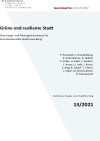
Ziel des Projekts war ein „Proof of Concept“ eines Regelkreises und Tool-Sets zur Steuerung, Optimierung und Evaluierung einer grünen und klimasensiblen Stadt(teil)planung bestehend aus städtebaulichen und freiraumplanerischen Instrumenten sowie Klimasimulationen auf unterschiedlichen Maßstabsebene.
Schriftenreihe
13/2021
F. Reinwald, C. Brandenburg, P. Hinterkörner, B. Hollósi, C. Huber, A. Kainz, J. Kastner, F. Kraus, U. Liebl, J. Preiss, Z. Ring, B. Scharf, T. Tötzer, J. Züger, M. Žuvela-Aloise, D. Damyanovic
Herausgeber: BMK
Deutsch, 124 Seiten
Downloads zur Publikation
Vernetzungstreffen zur Einreichung 9.SDZ 2021
10. Dezember 2021, 10:00 - 12:00 Uhr
Online
Innovationslabore gelten als Inkubatoren für Ideen und Projekte und wenden sich mit dieser Einladung an alle Akteur:innen, die sich mit Forschungs- und Entwicklungsfragen im Zusammenhang mit der Klimaneutralität von Gebäuden, Quartieren und Städten beschäftigen.
SmallWindPower@Home - Evaluierung der Auswirkungen von gebäudemontierten Kleinwindenergieanlagen auf Performance, Personen, Gebäude und Umgebung
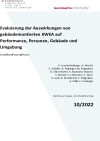
Im Projekt „SmallWindPower@Home“ erfolgte eine messtechnische Evaluierung der Auswirkungen von komplexen Hindernissen auf die Anströmung und Performance unterschiedlicher gebäudemontierter Kleinwindenergieanlagen (KWEA). Darüber hinaus wurden deren Auswirkungen auf das Gebäude, dessen Bewohner und die unmittelbare Umgebung untersucht.
Schriftenreihe
10/2022
K.Leonhartsberger, A. Hirschl,S.Schidler, B. Priglinger, M. Peppoloni,D.Österreicher, K. Baumann-Stanzer,S.Stenzel, C. Lotteraner, T. Duer,K.Leeb, K. Strohkendl, C. Tiefgraber,A.Stökl, F. Lachinger
Herausgeber: BMK
Deutsch, 166 Seiten
Downloads zur Publikation
Green SandboxBuilder: Regulatory Sandboxes im Bereich des nachhaltigen Bauens und Sanierens
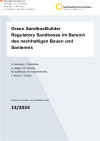
Im Projekt "Green SandboxBuilder" wurde erstmals in Österreich der Bedarf an Regulatory Sandboxes für ökologisch nachhaltige und klimawirksame Vorhaben im Baubereich systematisch erhoben. Die Umsetzung von Regulatory Sandboxes im österreichischen Bausektor kann dazu beitragen, die Einführung von technologischen, prozessualen und sozialen Innovationen entscheidend zu beschleunigen und somit die Nachhaltigkeitsziele zu erreichen.
Schriftenreihe
13/2024
G. Leimüller, J. Rohrhofer, A. Gerger, Ch. Schranz, M. Aichholzer, M. Schachenhofer, C. Benes, F. Ozclon
Herausgeber: BMK
Deutsch, 71 Seiten
Downloads zur Publikation
Fachkongress: Kostengünstiger und zukunftsfähiger Geschosswohnungsbau im Quartier
24. Januar 2019, 10:30 - 17:00 Uhr
Kulturzentrum Pavillon, Lister Meile 4, 30161 Hannover
Der von der deutschen Bundesregierung vorgesehene Bau von 1,5 Mio. Wohnungen stellt eine große Herausforderung und zugleich eine gewaltige Chance dar. Es gilt nicht nur eine Entspannung auf dem Wohnungsmarkt zu erzielen, sondern auch hochwertige zukunftsfähige und kostengünstige Gebäude und Quartiere zu realisieren.
Digitalisierung in der Bauwirtschaft
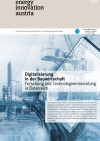
Forschung und Technologieentwicklung in Österreich
energy innovation austria
4/2018
Herausgeber: BMVIT und Klima- und Energiefonds
Deutsch, 8 Seiten
Downloads zur Publikation
Monitoringprojekt „Gebäude als Speicher“. Einfamilienhaus H. (Wind) und Einfamilienhaus F. (Solar)
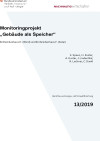
Monitoring und Vergleich der Leistungsfähigkeit der Thermischen Bauteilaktivierung in zwei bauähnlichen, bewohnten Einfamilienhäusern mit unterschiedlichen Energiequellen (Windstrom bzw. Solarenergie). Zentrales Anliegen ist es, die Funktionalität der Energieversorgung durch Wind- bzw. Photovoltaikstrom in Verbindung mit einem thermischen Speicher zu untersuchen. Die Ergebnisse liefern Erkenntnisse hinsichtlich Berechnungsannahmen, Anlagensteuerung sowie Umsetzbarkeit eines Smart-Grids.
Schriftenreihe
13/2019
S. Spaun, H. Kuster, A. Kuster, J. Lindenthal, R. Lechner, C. Dankl
Herausgeber: BMVIT
Deutsch, 53 Seiten
Downloads zur Publikation
Sanierungskonzept für das denkmalgeschützte Otto-Wagner-Areal zum Plus-Energie-Quartier
Im „Stadt der Zukunft“ Sondierungsprojekt „OttoWagner-ArealPlus“ wurde ein innovatives und gleichzeitig denkmalschutzverträgliches Sanierungskonzept zur Transformation des Wiener Otto Wagner-Areals in ein Plus-Energie-Quartier entwickelt. Das 50 Hektar Areal mit 63 Gebäuden und rund 175.000 m² BGF ist das weltweit größte zusammenhängende Jugendstil-Ensemble.
Tagung: Städtische Wärmewende
29. Jänner 2016
MuseumsQuartier ARENA 211070 Wien, AT
"Reden wir mal nicht über die Stromwende am Land, sondern über die Wärmewende in der Stadt" ist das Motto der Veranstaltung mit hochkarätigen in- und ausländischen Fachreferenten. Studienergebnisse und konkrete Umsetzungserfahrungen zur Wärmeversorgung von Städten und zur Wärmewende werden präsentiert.
World Sustainable Energy Days 2017: Ökoenergie im Fokus
1. - 3. März 2017
Wels
Die World Sustainable Energy Days bieten aktuelle Informationen über Technologien, Strategien und Märkte. Sie sind das globale Branchentreffen für nachhaltige Energie und bieten die ideale Gelegenheit für Networking & neue Kooperationen.
BIMaterial Process Design for Material Building Pass
Building Information Modelling supported compilation of a Material Building Pass; as a qualitative and quantitative documentation of the material composition of, and the material distribution within, a building structure. This project is a central milestone towards standardized, BIM-generated building material passes.
Stadt der Zukunft - Public Consultation 2015
Das Programm-Management von Stadt der Zukunft lädt Sie herzlich dazu ein, Anmerkungen zu den fünf Themenfeldern der 3. Ausschreibung im Herbst 2015 vorzunehmen und ergänzende Ideen und Themen vorzuschlagen.
